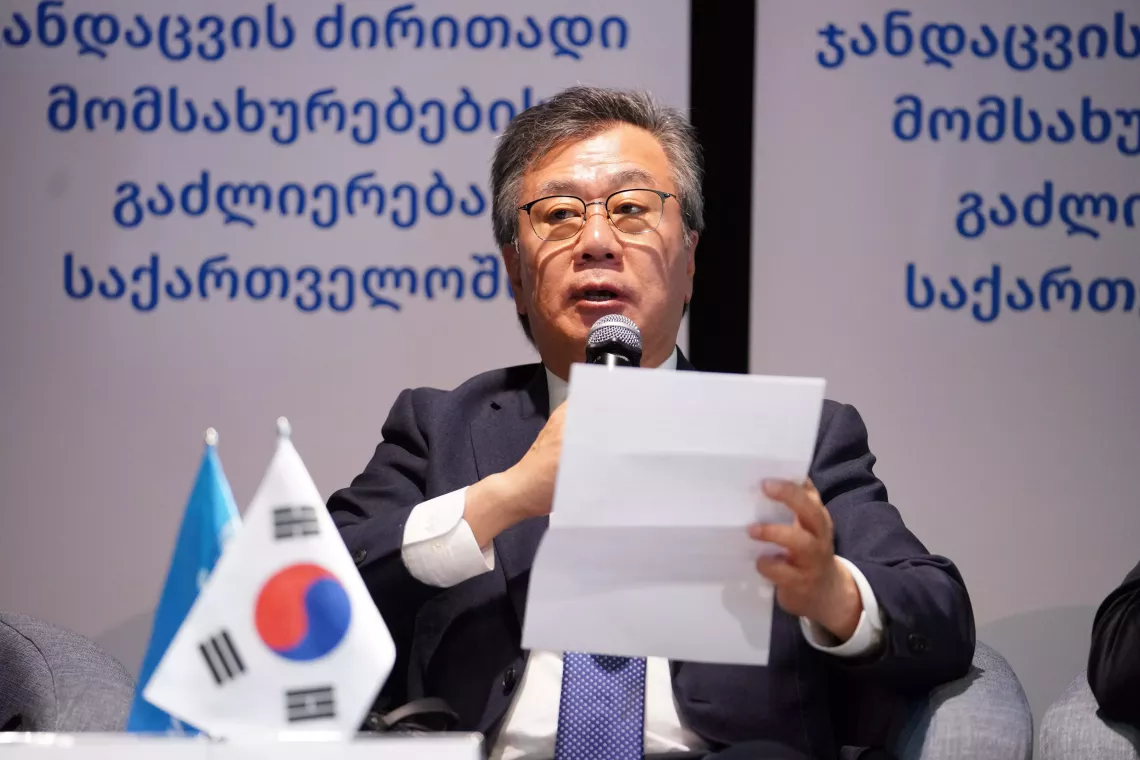UNICEF and the Republic of Korea join forces to strengthen Georgia's public health system
18 January 2024
The partnership aims at strengthening critical elements of the public health system, with a specific focus on Water, Sanitation, and Hygiene (WASH) and immunization in Georgia. This collaboration will enhance emergency response capacities, addressing weaknesses exposed during the COVID-19 pandemic and beyond.
The first ever partnership between UNICEF Georgia and the Government of the Republic of Korea was launched today by Charge D’Affairs of the Republic of Korea, Mr Kim Tong Op, First Deputy Minister of Internally Displaced Persons from the Occupied Territories, Labour, Health, and Social Affairs of Georgia, MsTamar Gabunia, Chair of the Parliamentary Committee on Health and Social Issues, Mr. Zaza Lominadze and Representative of UNICEF in Georgia, Mr Jesper Moller. The initiative will be implemented in close collaboration with the Government of Georgia.
The partnership aims at strengthening critical elements of the public health system, with a specific focus on Water, Sanitation, and Hygiene (WASH) and immunization in Georgia. This collaboration will enhance emergency response capacities, addressing weaknesses exposed during the COVID-19 pandemic and beyond.
“We are delighted to launch a new partnership with the Government of the Republic of Korea to support the Government of Georgia in strengthening essential health services”, said Jesper Moller, Representative of UNICEF in Georgia. “We extend a deep gratitude to the Government of the Republic of Korea for this important contribution and support. This collaboration marks a significant step towards a resilient and responsive public health system in Georgia, as it addresses current challenges and supports in building more sustainable health systems. We look forward to our collaboration and partnership for the health of every child of Georgia.”
The intervention focuses on three key areas:
- Capacity Building for Health Personnel: Developing the interpersonal communication (IPC) skills of health personnel to persuade parents, overcome vaccine hesitancy, and promote routine vaccinations.
- WASH Data Generation: Equipping national health authorities with tools to generate WASH-related data for Primary Health Care (PHC).
- Infection Prevention and Control: Supporting the Government in enforcing WHO/UNICEF recommended environmental and infection prevention and control guidelines and protocols.

UNICEF/Geo-2024/Sukhitashvili
In particular, within the new partnership, an accredited interpersonal communication course will be developed and delivered to 2000 health personnel of maternity houses and large policlinics across the country. The sessions will be led by local experts, offering interactive and evidence-based training sessions, to help health practitioners to identify and address their own biases and misconceptions and to equip them with the essential knowledge and skills on positive interpersonal communication around vaccination.
The project will develop and pilot the electronic monitoring system on WASH for primary health care facilities providing possibility of obtaining real-time data. The project will also focus on increasing capacities of the respective staff from the clinics across the country on data collection and assessment.
The initiative will also address infection prevention and control at all rural primary health care settings through training of healthcare facility staff who have a role in the development, management or oversight of environmental cleaning services for the healthcare facility.
COVID-19 vaccination hesitancy has greatly affected the uptake of routine vaccinations. Despite concerted efforts, challenges persist, with the anti-vaxxer movement actively opposing vaccination promotion work. Additional impeding factor for vaccine uptake is low compliance among the health personnel. Health providers have always been an important and trusted source of information for parents and caregivers. The way they interact with families and the quality of their communication and engagement may have a positive or negative influence on patients’ decision to immunize.
The COVID-19 pandemic has also highlighted the importance of safe WASH services in health facilities to enable life-saving infection prevention and control practices, curb the spread of antimicrobial resistance, and help in delivering quality primary health care services to all. Absence of real-time data on WASH and waste management services hampers quality of primary health care service and increases the risk of infection, which can be deadly for children and mothers.
About the project:
The Government of Korea contributed USD 20 million toward UNICEF’s Access to COVID-19 Tools Accelerator (ACT-A) work. This grant is carried out by 22 country offices across all 7 UNICEF regions between mid-2023 and mid-2024. The UNICEF/ROK ACT-A partnership will support three broad interventions. The country-specific interventions were determined based on the needs on the ground. These include: (1) Support COVID-19-related recovery and restore essential health services, including immunization, to prevent backsliding of SDG 3 on ending preventable deaths; (2) Strengthening primary healthcare, with focus on community health systems; (3) Strengthening primary health care infrastructures (WASH, oxygen systems).


